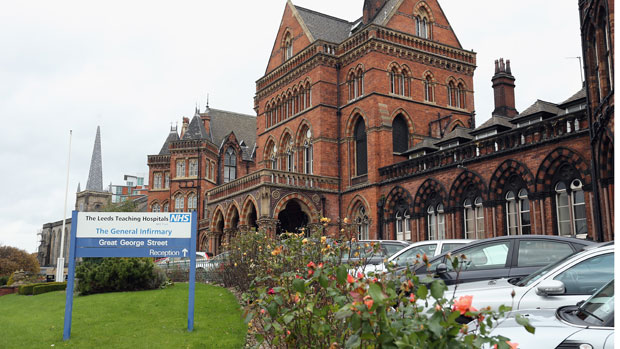Leeds children's heart unit 'safe' after death rate fears
But report details 'heart rending' stories of 16 families who suffered serious problems with care

A free daily email with the biggest news stories of the day – and the best features from TheWeek.com
You are now subscribed
Your newsletter sign-up was successful
A CHILDREN'S heart surgery unit in Leeds, which was suspended after patient death rates appeared too high, has been deemed safe after a year-long review.
The paediatric heart unit at Leeds General Infirmary was temporarily closed last March, before a swiftly-conducted review concluded that services were safe to resume a few weeks later.
The results of a second, more in-depth NHS England review has now concluded that the unit is "safe and running well".
The Week
Escape your echo chamber. Get the facts behind the news, plus analysis from multiple perspectives.

Sign up for The Week's Free Newsletters
From our morning news briefing to a weekly Good News Newsletter, get the best of The Week delivered directly to your inbox.
From our morning news briefing to a weekly Good News Newsletter, get the best of The Week delivered directly to your inbox.
However, the report did find serious problems with the care offered to 16 families of very sick children.
Dominic Hughes, BBC health correspondent, described their testimony as "heart rending". The report details how "at a time of extraordinary stress, they experienced a lack of compassion, poor counselling and badly handled complaints", says Hughes.
Out of hundreds of children treated at the unit every year, 16 families represents a "tiny minority", he says, but the report makes clear that every single one of them is entitled to the best possible care.
One parent, who has not been named, told investigators they were given "no support" by staff after their daughter had died. "We were given a leaflet," they said. "Nobody asked how we were getting home in the early hours of the morning."
A free daily email with the biggest news stories of the day – and the best features from TheWeek.com
Another parent described how a book, in which their son had been writing about his experiences before his death, had gone missing.
Julian Hartley, from Leeds Teaching Hospitals Trust, offered a "heartfelt apology" to the families affected. "Although we treat 10,000 children a year and do 800 operations, one poor experience is one too many," he said.
Hartley added that action had already been taken to improve services, including the appointment of three permanent consultant surgeons, a full review of how complaints are handled and the opening of a new £1.75m children's intensive care unit.
-
 How the FCC’s ‘equal time’ rule works
How the FCC’s ‘equal time’ rule worksIn the Spotlight The law is at the heart of the Colbert-CBS conflict
-
 What is the endgame in the DHS shutdown?
What is the endgame in the DHS shutdown?Today’s Big Question Democrats want to rein in ICE’s immigration crackdown
-
 ‘Poor time management isn’t just an inconvenience’
‘Poor time management isn’t just an inconvenience’Instant Opinion Opinion, comment and editorials of the day
-
 A real head scratcher: how scabies returned to the UK
A real head scratcher: how scabies returned to the UKThe Explainer The ‘Victorian-era’ condition is on the rise in the UK, and experts aren’t sure why
-
 How dangerous is the ‘K’ strain super-flu?
How dangerous is the ‘K’ strain super-flu?The Explainer Surge in cases of new variant H3N2 flu in UK and around the world
-
 The ‘menopause gold rush’
The ‘menopause gold rush’Under the Radar Women vulnerable to misinformation and marketing of ‘unregulated’ products
-
 How the care industry came to rely on migrant workers
How the care industry came to rely on migrant workersThe Explainer Government crackdown on recruiting workers abroad risks deepening care sector crisis, industry leaders warn
-
 Could medics' misgivings spell the end of the assisted dying bill?
Could medics' misgivings spell the end of the assisted dying bill?Today's Big Question The Royal College of Psychiatrists has identified 'serious concerns' with the landmark bill – and MPs are taking notice
-
 Washwood Heath: Birmingham's pioneering neighbourhood health service
Washwood Heath: Birmingham's pioneering neighbourhood health serviceIn the Spotlight NHS England chair says there is a 'really good argument this is the model for the future'
-
 The UK's first legal drug consumption room
The UK's first legal drug consumption roomThe Explainer 'Potentially transformative moment in UK drugs policy' as The Thistle opens in Glasgow
-
 How can the UK solve the adult social care crisis?
How can the UK solve the adult social care crisis?Today's Big Question New commission announced to turn our buckling care sector around: yet more delay or finally a way forward?